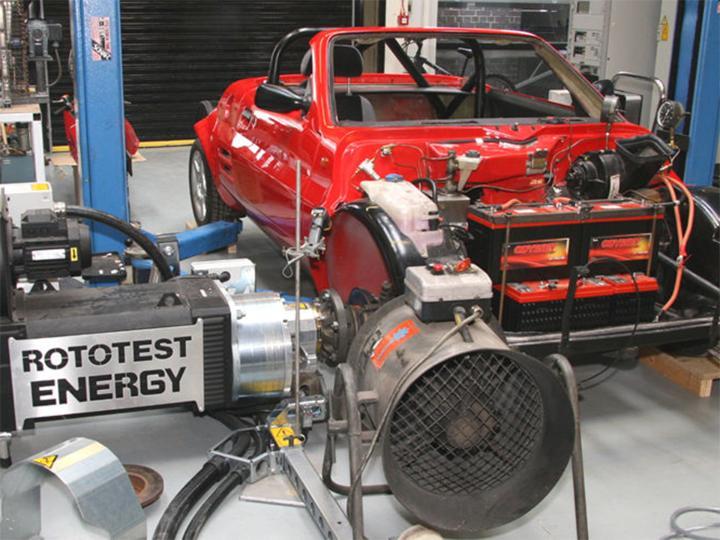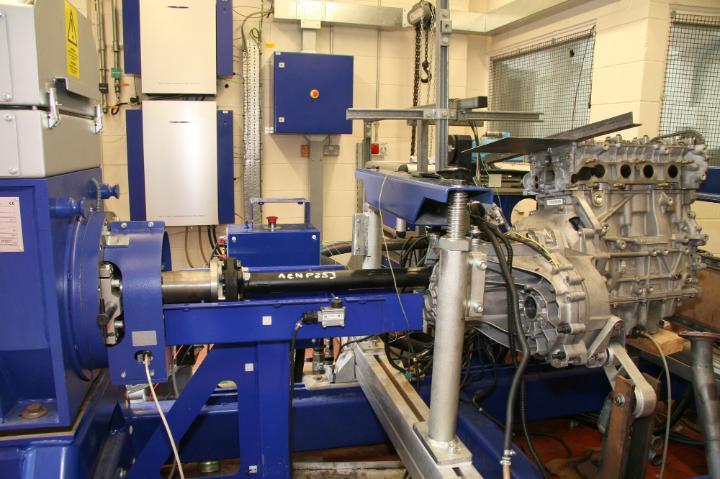Research groups at the Automotive Research Centre
Braking Research Centre
Collectively the members of the Braking Research Centre (BRC) combine over 60 years of experience in the field of brakes and braking systems. We specialise in all areas of vehicle brake technology and specifically on trends in refinement and technology development including:
- Friction pair modelling
- Thermal issues
- NVH
- Brake simulation
- Brake actuation
- System modelling
Our research techniques of physical testing and validation are carried out in our Braking Research Laboratory which houses bespoke test rigs for NVH, thermal and friction testing.
The research team have over 30 years history of collaborating with industry on brake research projects to provide successful resolution to many refinement issues. The knowledge gained through our research also feeds into the annual Braking of Road Vehicles course enabling it to remain current and up-to-date. We also offer bespoke short courses in braking to individual companies.
We have worked with Bentley Motors, Honda, BMW, Jaguar Land Rover,Toyota, Bosch, TMD Friction, Roulunds, Meritor, BPW, Alcon, VALX, TMETC, Ford.

Bradford Engineering Quality Improvement Centre

As one of the leading UK University groups focusing on the advancement of Engineering Quality Improvement (EQI) practice to enhance the effectiveness of product and process creation, we are enhancing the capability of engineers in using engineering quality and reliability tools in the continuous improvement of products, processes, and systems in design and manufacture.
Established in 1994 as a Masters partnership between the University and Ford Motor Company we have since developed a strong track record of success in working with industry, providing innovative solutions for postgraduate professional development, consultancy and applied research focused and tailored to the needs of our partners.
Our bespoke consultancy service assists companies with product and process design, quality improvement, and failure avoidance strategies in the following areas:
- Facilitation and documentation of Failure Mode Effects Analysis.
- Design Verification Planning including bespoke analysis and test development.
- Reliability Analyses including Fault Tree Analysis and Product Lifetime Modelling.
- Robust Design Analyses including Parameter Diagrams and Noise Factor Management.
- Analyses of Product function including Functional Tree Analyses and Interface Analysis.
- Practical Problem Solving applied to product and processes.
- The team have applied these and other methods within the automotive sector and are expanding the application of many techniques to provide services for aerospace and domestic appliance organisations.
BEQIC is supported by academics with track records in the application of engineering quality improvement tools, product development, and manufacturing. With the strength of industry experts, who contribute the wealth of their knowledge, we use innovative and pragmatic problem-solving approaches to develop tools and methods to solve automotive engineering challenges.
The Director of BEQIC, Dr. Felician Campean, is a leading authority in "Failure Mode Avoidance", a methodology which is applied to design and manufacturing processes in the Automotive Industry to ensure highest consistency and customer focused quality in the product.
We have a dedicated suite of seminar, breakout, and study rooms within the School of Engineering which offers a suitable environment for company off-site training and development. If you prefer your training on-site, we can also deliver bespoke and/or 'off-the-shelf' short courses in the workplace.
Advanced Engineering Systems Optimisation
The interdisciplinary research team in Advanced Engineering Systems Optimisation (AESOp) addresses the development of design optimisation frameworks, tools, and evaluative applications studies to meet the challenges of maximising the potential of complex engineering systems.
Typical systems comprise multiple interacting disciplines and objectives, highly non-linear constraint envelopes, and high-cost discipline analyses (e.g. automotive vehicle design).
The primary focus of AESOp is the development of tools to aid the reduction of the design-to-production time in complex design, development, and manufacturing processes. Despite major advances in engineering analysis, the complexity of integrating multiple sub-systems towards optimised product development remains a bottleneck, and thereby has a significant economic impact upon development and production processes (e.g. automotive, manufacturing, environment, resource management).
Through its membership, AESOp is able to investigate issues with a skill set that brings together mathematical and numerical understanding with engineering and industry requirements knowledge.
The Research Team integrates mathematicians with both academic and industrially-based engineers, reinforcing the interdisciplinary research ethos promoted in the School of Engineering.
The Research Team collaborates with Ford, Jaguar-LandRover, and Switchgear & Instrumentation, and maintains links with the Multi-disciplinary Optimisation Group at the University of Leeds (MOGUL).
Hybrid Powertrain & Engineering Research Centre
The Hybrid & Powertrain Engineering Research Centre (HyPER-C) was started in 2006. It provides state-of-the-art experimental and simulation facilities in a laboratory with two computer controlled regenerative dynamometers, one of which is unique (in the UK) being for large engines up to 500kW.
Other equipment includes:
- Hardware-in-loop with powertrain modelling
- An axle mounted Chassis Dynamometer
- Brake and friction test rigs
- Mechanical power transmission (belts) test rigs
- In-vehicle instrumentation and datalogging equipment with GPS for on-road vehicle and driver evaluation.
This advanced research facility is supported by funding from industrial partners and the UK's Technology Strategy Board to support fundamental and applied research.
The Centre's commitment to technology transfer is further demonstrated by four MSc courses that deliver professional postgraduate training in the latest technologies, and Continuing Professional Development (CPD) short courses, including the annual international course on the Braking of Road Vehicles to meet the professional needs of the Automotive industry.

Advanced Automotive Analytics Laboratory
The Advanced Automotive Analytics (AAA) Laboratory is an interdisciplinary collaboration between researchers in Computer Science and Automotive Engineering, focused on research and development of big data science methods and solutions to enhance vehicle reliability throughout the lifecycle – from design to service and reuse. The AAA Lab provides a unique set of world class computational and analytics expertise and facilities for knowledge discovery from complex automotive engineering challenges with fresh innovative machine learning techniques, funded by renowned industry partners and organisations. The team launched the successful workshop series Engineering Data and Model driven Applications (EDMA) now at the fourth edition.
References:
https://www.bradford.ac.uk/automotive-research-centre/research-groups/#d.en.46594
https://ieeexplore.ieee.org/stamp/stamp.jsp?arnumber=8276688
https://www.computer.org/csdl/pds/api/csdl/proceedings/download-article/183rAdeMwKw/pdf
https://www.bradford.ac.uk/automotive-research-centre/edma-2019/EDMA19CfP_vFC.pdf
Computing Enterprise Centre
Bradford Computing Enterprise Centre is a software development unit providing knowledge transfer and custom software solutions to clients using a combination of academic researchers' and students' problem-solving expertise and skills. The beneficiaries producing short-term projects are local SMEs, departments and organisations funded through a variety of sources including Access Innovation, European Commission Erasmus+, Innovate UK and industry.
Find out more about the Computing Enterprise Centre >>
References:
https://www.bradford.ac.uk/computing-enterprise-centre/
https://www.linkedin.com/pulse/bradford-universitys-computing-enterprise-centre-open-john-steele/

